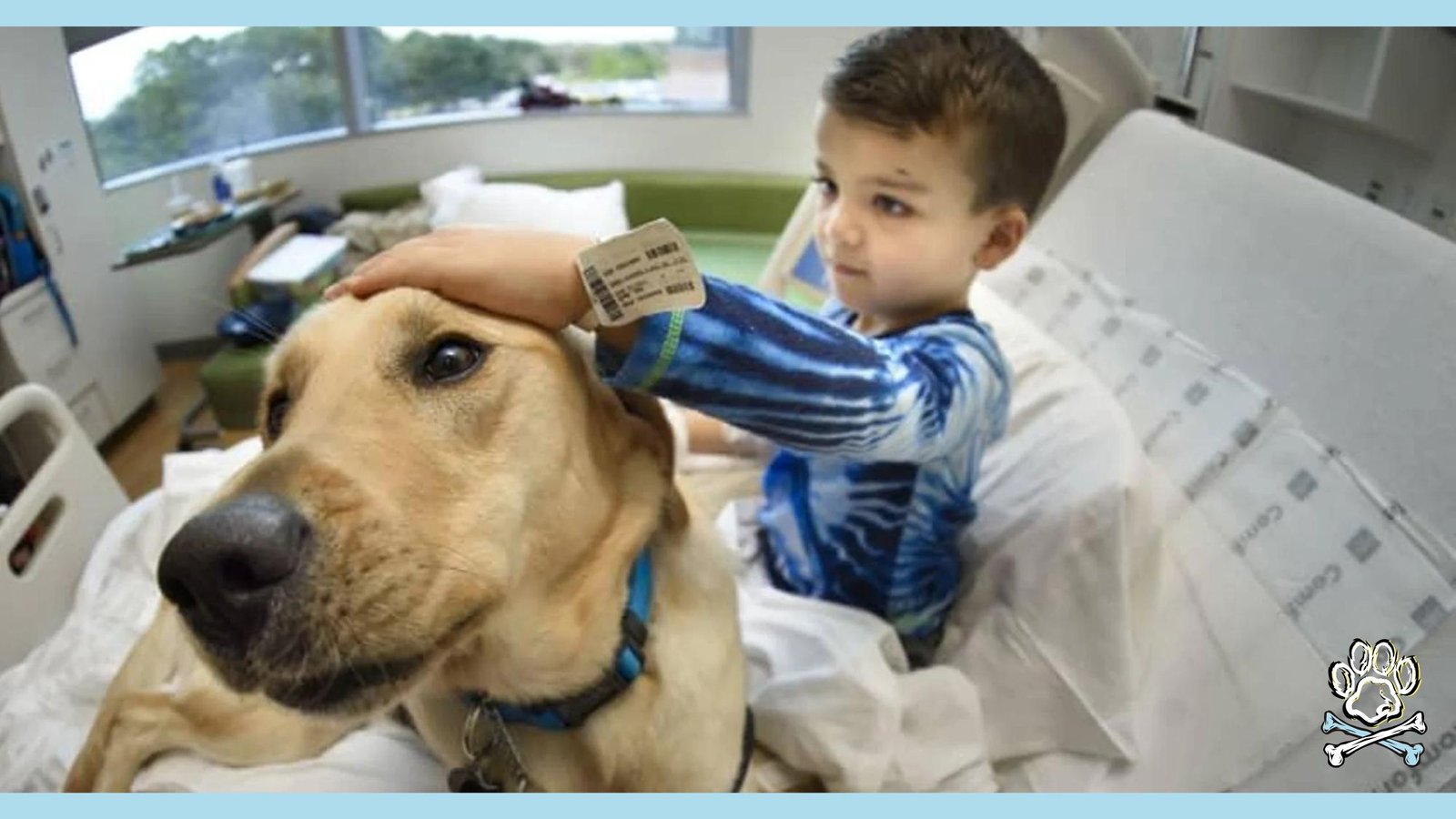Does your autistic child face difficulties with socializing or dealing with daily stress? The service dogs could provide incredible support. This guide explores the process of matching children with dogs, specialized training, and ongoing assistance to enhance social skills and reduce anxiety.
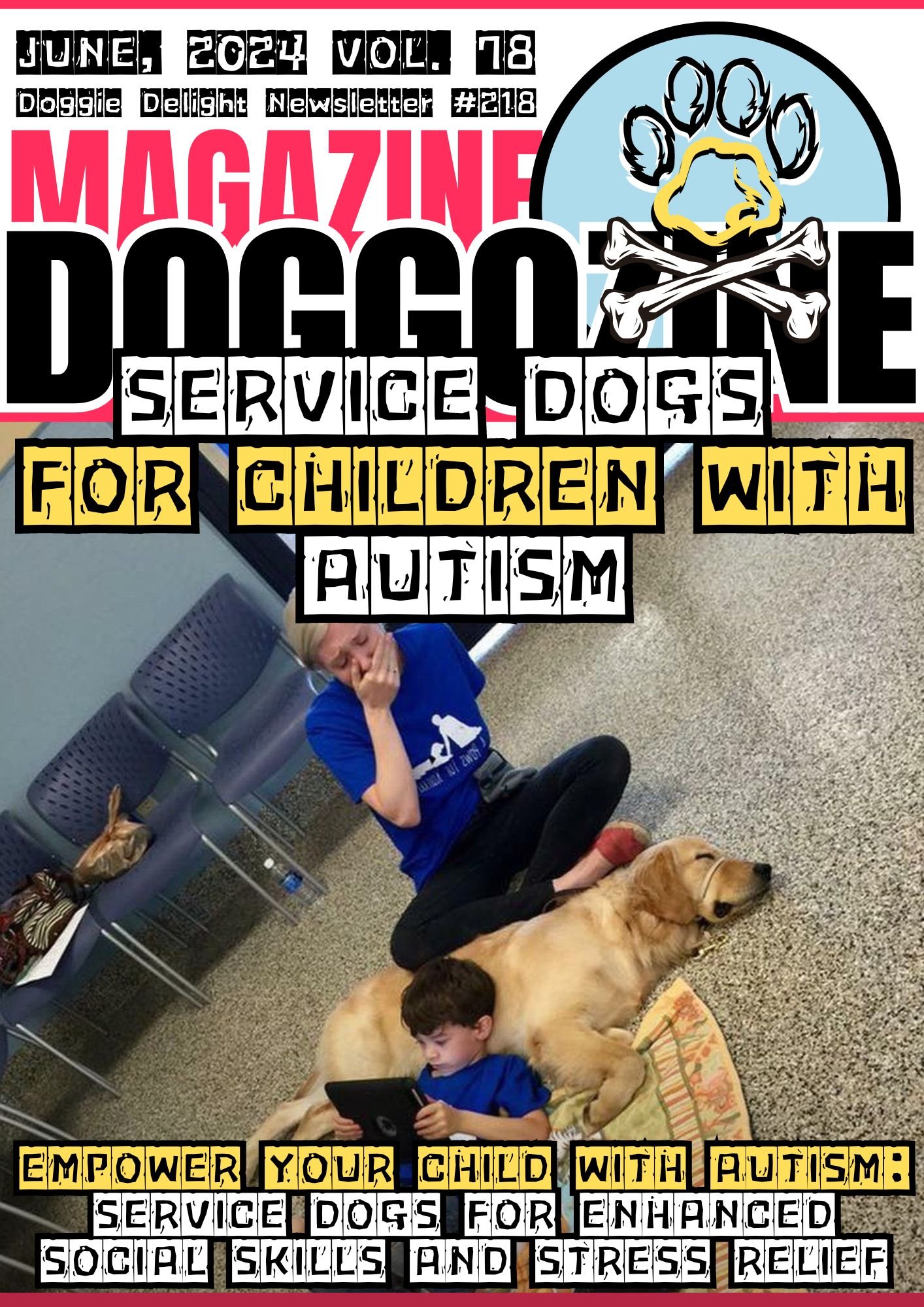
EMPOWER YOUR CHILD WITH AUTISM: SERVICE DOGS FOR ENHANCED SOCIAL SKILLS AND STRESS RELIEF
Imagine your child thriving with a furry companion’s constant support. From improving communication to seamlessly integrating a service dog into your family, every step empowers your child and family. Join us as we explore how service dogs revolutionize the lives of autistic children.
Understanding Autism Spectrum Disorder
Autism Spectrum Disorder (ASD) is a developmental disability affecting communication, social interaction, and behavior. Symptoms vary widely among individuals. Some common traits include challenges with social skills, repetitive behaviors, and sensory sensitivities. For instance, an autistic child may struggle with eye contact, conversations, or understanding facial expressions and body language. They might engage in repetitive actions like rocking or arranging objects in specific patterns.
The Life-Changing Impact of Service Dogs
Service dogs undergo rigorous training to assist children with autism. These loyal companions provide invaluable support.
They can help children:
- Remain calm and focused in stressful situations
- Develop better communication and social skills
- Increase independence and confidence
- Enhance safety and reduce wandering risks
A service dog’s presence can create a calming effect, reducing anxiety and aggression. Their companionship fosters a sense of security, allowing children to navigate social situations more comfortably.
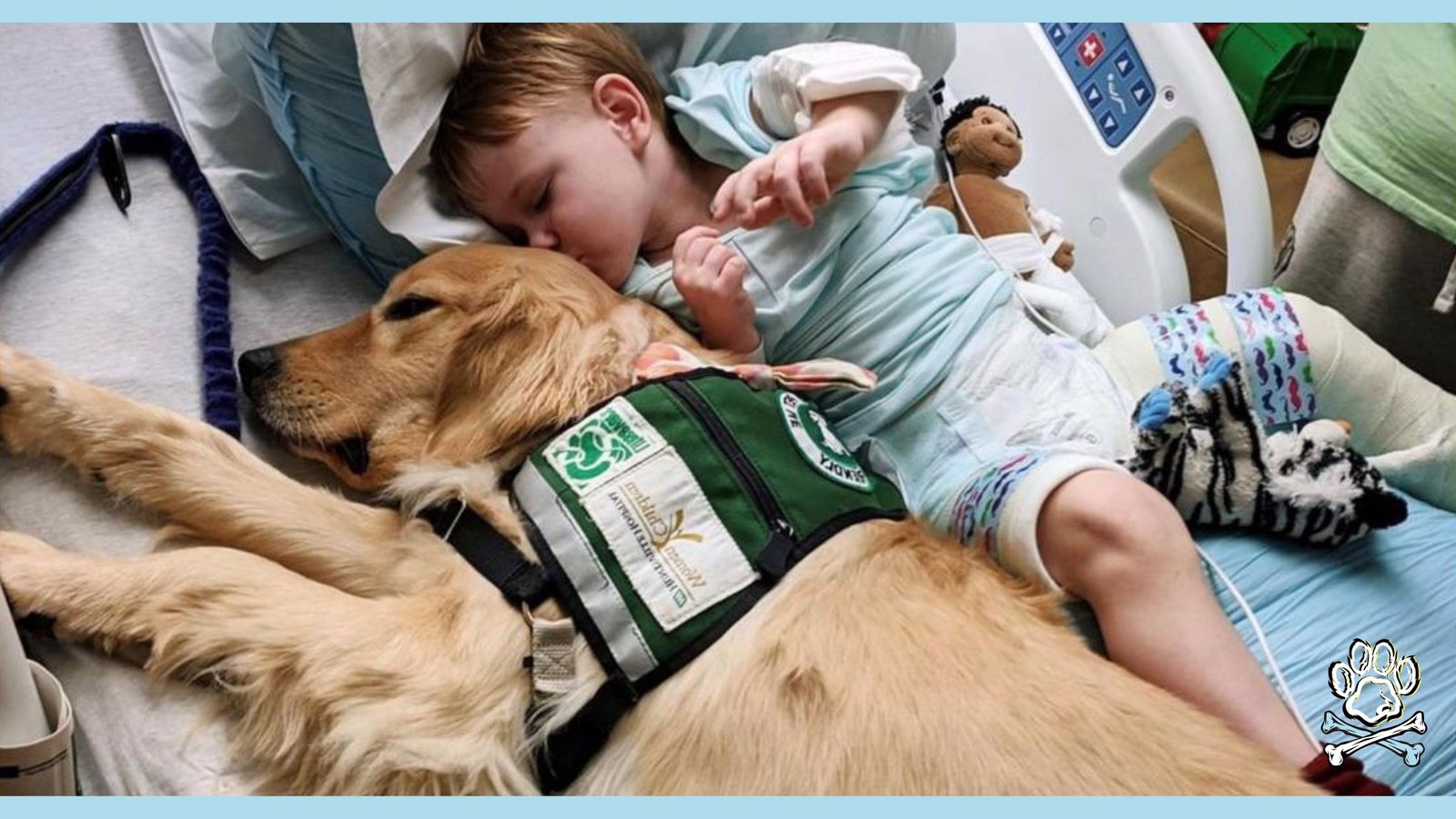
Customized Training for Unique Needs
Each child with autism has unique needs and challenges. Service dog trainers tailor the training program accordingly.
They teach the dog specific tasks, such as:
- Providing deep pressure therapy to soothe sensory overload
- Interrupting self-harming or repetitive behaviors
- Serving as a grounding anchor in public settings
- Retrieving emergency items or medication
The training process also involves teaching the child and family how to work with the service dog effectively. This comprehensive approach ensures a seamless integration into daily life. Each person with autism is unique. They have their own strengths and difficulties. There is no single cause of autism. Research shows a mix of genes and environment may play a role.
🔑 Key Points: Autism Spectrum Disorder (ASD) is a complex developmental disability. It affects social skills, communication, and behavior differently in each individual.
The Role of Service Dogs in Autism Support
Service dogs can be very helpful for kids with autism. They provide emotional support and practical help daily. These specially trained dogs can improve social skills, reduce anxiety, and increase independence. Imagine a child with autism feels overwhelmed in a crowded store. Their service dog can be calming. It can help them navigate the environment with less stress. The dog can also help the child interact with others and build relationships.
Besides emotional support, service dogs can do specific tasks, such as:
- Interrupting and stopping destructive behaviors
- Providing deep pressure therapy during meltdowns
- Helping with transitions between activities
- Alerting caregivers if the child wanders or bolts
By assisting with these practical skills, service dogs help kids with autism better navigate daily life. They build valuable experiences.
🔑 Key Points: Service dogs offer a supportive approach for kids with autism. They provide emotional comfort and assist with social skills and daily tasks.
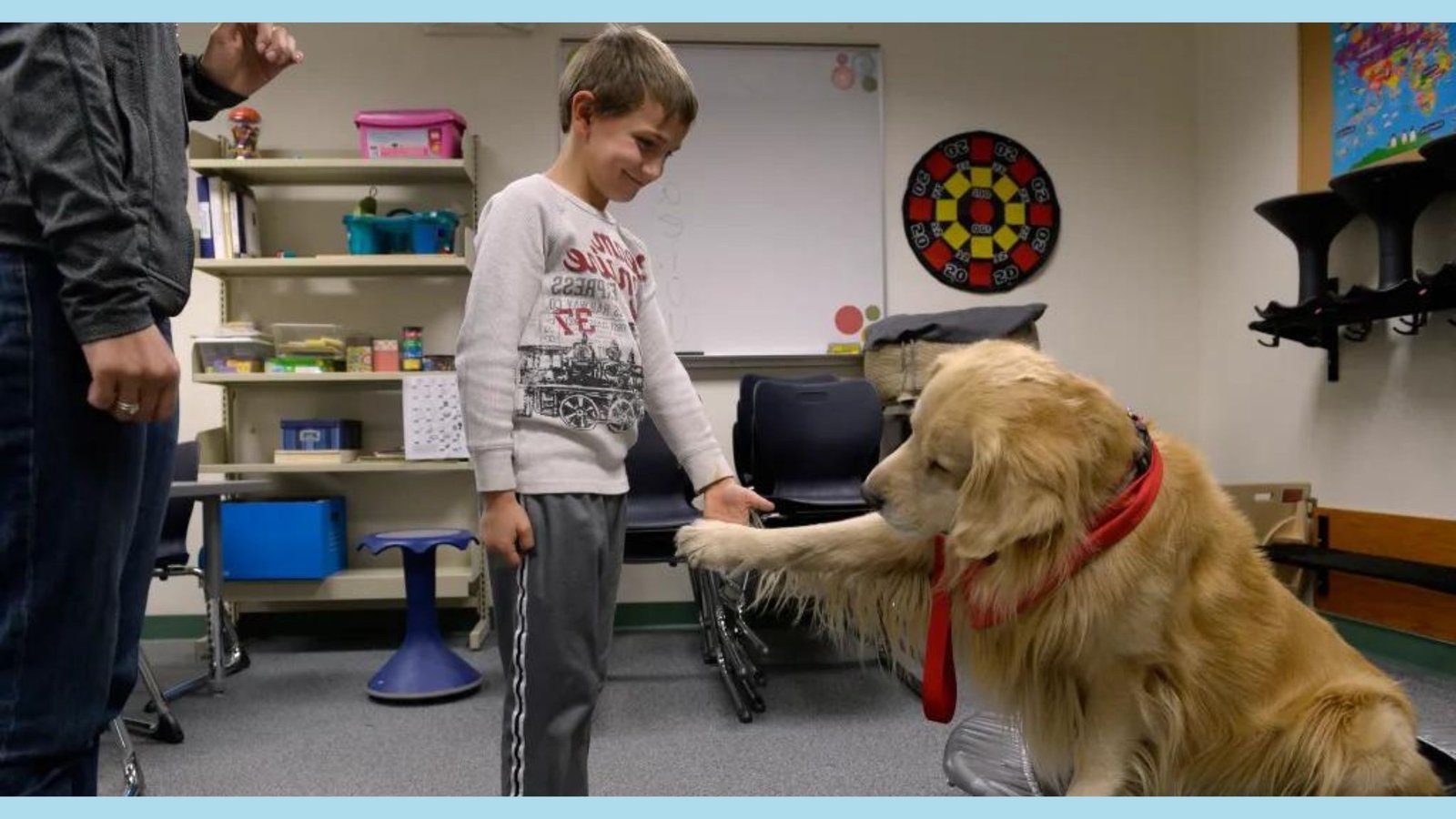
CHOOSING THE RIGHT DOG: THERAPY, COMPANION, OR SERVICE
When considering a dog for a child with autism, it’s crucial to know the differences. There are therapy dogs, companion dogs, and service dogs. Each has a specific purpose and level of training.
Therapy Dogs
Therapy dogs provide comfort and affection in places like hospitals or schools. They don’t have the same rights as service dogs. And they aren’t trained for specific tasks for disabled people.
Companion Dogs
Companion dogs, also called emotional support animals, give comfort and emotional support. They don’t require special training. And they don’t have the same legal protections as service dogs.
Service Dogs
Service dogs, including autism service dogs, are trained for specific tasks. They help handlers with disabilities. They have legal access rights under the ADA. So, they can go places pets can’t. Some service dogs are bred and raised for this role. Others may be rescued dogs with the right temperament and training ability. The best dog depends on the child’s needs and level of support required.
🔑 Key Points: Knowing the differences between therapy, companion, and service dogs is vital when choosing the right dog to support a child with autism. This helps ensure the child receives appropriate assistance.
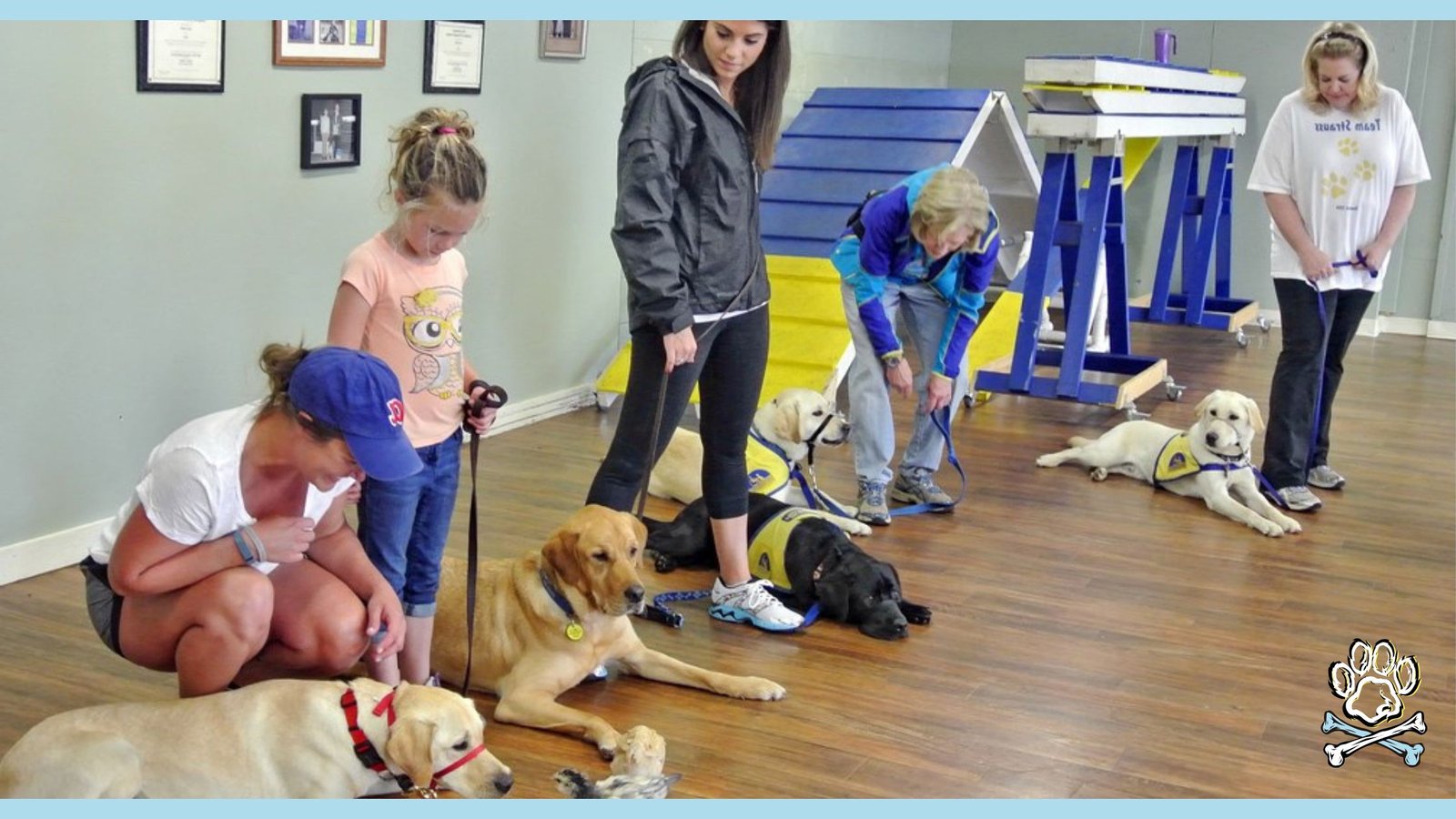
THE PROCESS OF CLIENT-DOG MATCHING
We will shed light at the non-profit organization Integrity Inc. and their work with service dogs for Autism, they take great care in matching children with autism to the perfect service dog. It’s a thorough process that considers the child’s unique needs, personality, and lifestyle.
Steps To Get Perfect Dog
First, they assess the child’s abilities and requirements. Experts evaluate the child’s strengths, challenges, and goals for a service dog partnership. They interview family members and observe the child in various settings. Then, the organization selects a dog with the right temperament, energy level, and training potential. The dog’s size, breed, and personality are considered. For instance, a larger, sturdy breed may suit a child needing mobility support. A calmer dog could benefit a child with anxiety.
Next, the child and potential dog meet in a controlled setting. Trainers observe their interaction to see if they connect naturally. If it’s a successful match, the dog begins custom training tailored to the child’s specific needs. This careful matching process ensures the child receives a service dog perfectly suited to provide the necessary assistance. It fosters a strong bond between child and dog, enhancing the child’s independence and quality of life.
🔑 Key Points: Carefully matching a child with an autism service dog involves considering the kid’s unique requirements, the dog’s temperament, capabilities, and training potential. This ensures a successful long-term partnership.
Highlights of Specialized Training for Autism Service Dogs
Service dogs for children with autism undergo extensive customized training to cater to each child’s specific needs. At organizations such Integrity, highly skilled trainers put the dogs through a rigorous 2-year program.
First, basic obedience and socialization ensure the dog behaves well and stays calm in varied settings. Then, trainers teach tasks tailored to the child’s particular challenges. For instance, if a child struggles with sensory overwhelm, the dog learns deep pressure therapy. It recognizes distress signs and gently lies across the child’s lap or leans against them to provide a calming weight.
Other potential tasks include:
- Interrupting repetitive behaviors with a gentle nudge
- Guiding transitions by leading the child to the next activity
- Offering a reassuring presence in unfamiliar environments
- Alerting caregivers if the child wanders or bolts
Through this intensive process, the service dog builds a close bond with the child based on trust and mutual understanding. Regular sessions reinforce skills to ensure reliable real-world performance.
🔑 Key Points: The customized training approach focuses on teaching specific tasks. It meets each kid’s needs. The pup develops a strong bond with the kid through practice.
Mastering Communication: How These Dogs Help
Autism service dogs can help kids with autism. Kids often struggle with nonverbal communication. The dogs assist with understanding social cues. For instance, the dog responds to commands like “look” or “watch.” It directs the kid’s attention to facial expressions and body language. If someone smiles and greets warmly, the dog may wag its tail. It signals a positive interaction.
The dog models proper social behavior. It maintains eye contact and stays calm. By observing their companion, kids learn valuable skills. They apply these skills in their interactions. Also, the service dog provides comfort and security. It’s a non-judgmental pal. The dog’s presence boosts confidence in social settings. This makes it easier for kids to engage with others.
🔑 Key Points: Dogs trained to assist kids with autism can be very helpful. They model good social behaviors and respond to social cues. The dogs provide comfort in social situations, which helps kids communicate better.
Enhancing Social Skills Through Canine Assistance
One of the biggest benefits of autism service dogs is how they improve social skills. They help kids with autism interact more. Many kids with autism struggle to start and keep social connections. But a service dog can make it easier for them to engage with others.
For example, when out with their service dog, people may approach the child to talk about the dog. The dog becomes something interesting they both can focus on. This shared interest helps break the ice and start social interactions.
Service dogs can also help kids with autism:
- Practice conversation skills by giving simple commands and praise: The child learns to engage with the dog using basic language. This helps build conversation abilities.
- Develop empathy by learning to recognize and respond to the dog’s needs: The child learns to understand what the dog needs, like food, water, or going outside. This helps build empathy.
- Engage in shared activities, like playing fetch or going for walks: Doing fun things together strengthens the bond between child and dog. It gives practice for social engagement.
- Learn to read and interpret nonverbal communication cues: Dogs communicate through body language and sounds. The child learns to pick up on these nonverbal cues.
By interacting regularly with their service dog, kids build social confidence. The dog’s unconditional love provides security, making it easier to step out of their comfort zone. This support helps kids engage more with others.
🔑 Key Points: Dogs trained to support kids on the autism spectrum act as friendly companions. They make it easier for these children to learn and practice important social skills. The dog’s non-judgmental nature creates a relaxed environment for social development.
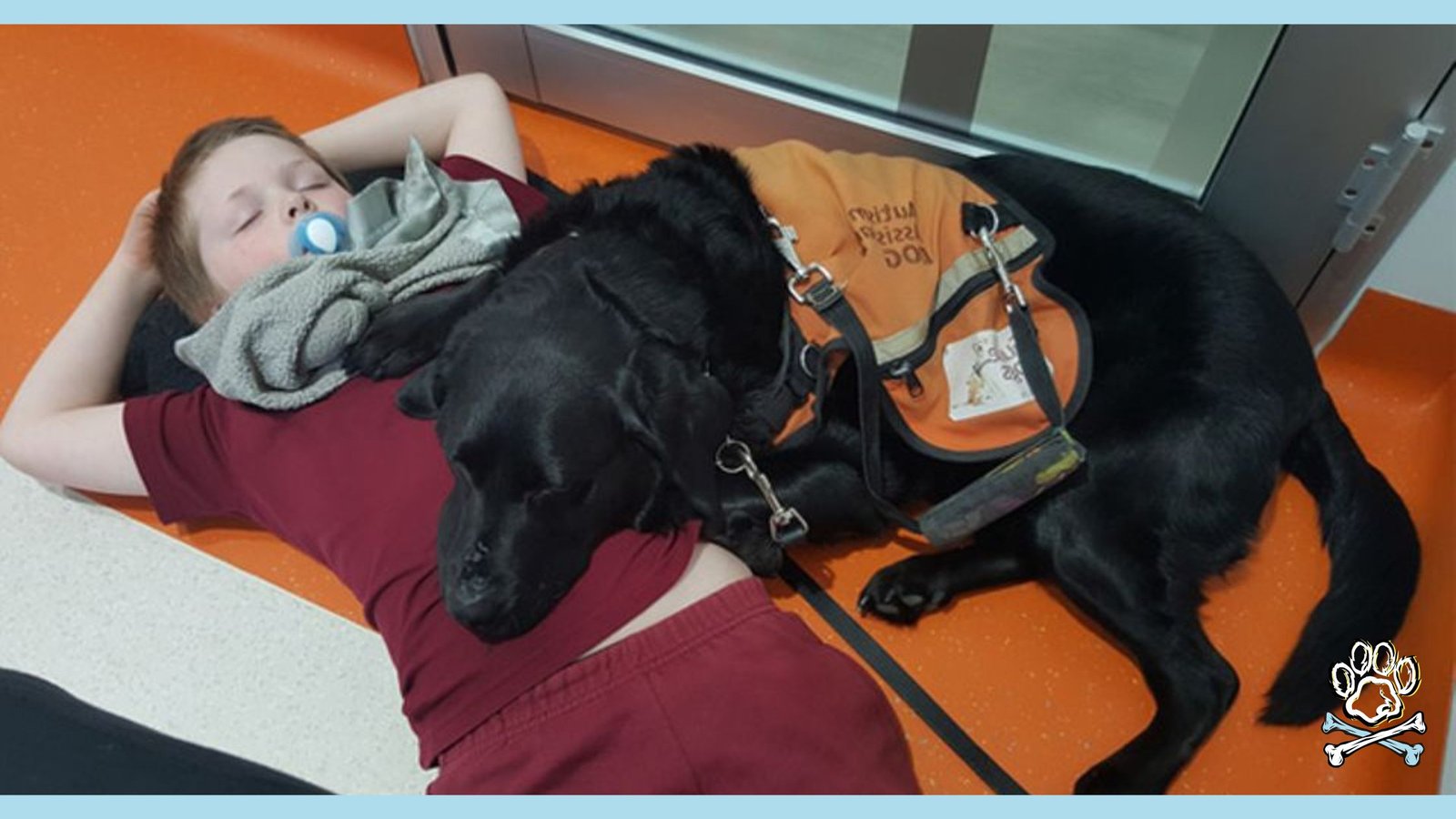
THE EMOTIONAL AND PRACTICAL HELP SERVICE DOGS PROVIDE
In addition to aiding social skills, service dogs offer vital emotional and practical assistance to autistic children. Having a service dog nearby greatly improves a child’s overall well-being and quality of life.
Service Dogs Boost Confidence and Offer Comfort and Joy
Emotionally, service dogs provide constant friendship and a sense of security. For kids who feel anxious or overwhelmed, having their dog near calms them. The dog’s unconditional love boosts self-esteem and confidence. Kids feel more capable handling daily challenges. The bond between child and service dog offers comfort, joy, and emotional support.
Practically, service dogs assist with many daily tasks and difficulties. For instance, they help kids stay focused during school or therapy. They provide touch stimulation during sensory overload. They also help with transitions between activities or environments.
- Helping kids stay on-task at school or therapy
- Offering calming touch during sensory issues
- Smoothing transitions between activities
- Alerting caregivers to wandering or bolting behaviors
Service dogs offer invaluable help for kids with autism. They can alert parents if their child wanders off or tries to bolt. This practical assistance aids child independence and self-regulation.
🔑 Key Points: Autism service dogs blend emotional and practical support. They help autistic kids feel secure, confident, and capable. The dogs assist with daily life challenges.
Training the Family: Integrating a Service Dog into Your Home
Getting an autism service dog is a big commitment. Families must prepare, learn, and get ongoing support. At the organizations as Integrity dog therapy clinic, they undergo team training. This teaches how to work with and integrate the new service dog.
The team training process has several stages:
- Learning the dog’s tasks and commands
- Practicing handling skills and bonding with the dog
- Navigating public spaces and social situations with the dog
- Establishing daily routines and care responsibilities for the dog
During sessions, families learn to give clear commands. They interpret the dog’s body language and reinforce good behaviors. They also learn the dog’s unique abilities and how to use them. A service dog is not just a skilled companion. It’s a living animal with needs and personality.
Families must provide for its physical, emotional, and mental well-being, like any pet. Taking care of a service dog needs effort. It involves giving the dog regular exercise, a healthy diet, veterinary check-ups, and lots of love. By creating a caring environment and building a strong bond, families can reap the full rewards of this life changing partnership.
🔑 Key Points: To successfully integrate an autism service dog into family life, team training is crucial. Ongoing support and meeting the dog’s physical and emotional needs as a valued family member are also important.
Continuous Support and Recertification: Ensuring Ongoing Effectiveness
The journey with an autism service dog continues after initial training and certification. Ongoing support and recertification are vital to ensure long-term success and effectiveness of the assistance dog team.
At any successful dog therapy clinic team support is a priority. After certification, they provide regular check-ins, additional training when needed, and resources to navigate challenges. This support helps maintain the dog’s skills, address new needs or concerns, and ensure the well-being of both child and dog.
Recertification is another key aspect of ongoing support. Every two years, assistance dog teams must undergo recertification. This process ensures the dog’s skills remain sharp and the partnership still meets the child’s needs effectively.
Recertification may involve:
- Assessing the dog’s obedience, public access skills, and task performance.
- Evaluating the child’s ability to work with and handle the dog.
- Providing additional training to reinforce or teach new skills if needed.
- Ensuring both the child and dog are comfortable and benefiting from the partnership.
Recertification allows trainers to identify areas needing improvement. It also gives families peace of mind, knowing their assistance dog team meets all standards. With continuous support and recertification, families can rely on their service dog’s abilities for years to come.
Steps to Recertification
- Demonstrating the dog’s ability to perform its trained tasks: At regular intervals, the service dog will go through evaluations. These tests show how well the dog can do its special jobs. This helps ensure the dog is ready to assist its handler.
- Assessing the dog’s behavior and obedience in various settings: Trainers will observe how the service dog acts in different places. They’ll make sure it listens well to commands. This checks if the dog behaves properly in public areas.
- Updating any changes in the child’s needs or the dog’s health status: As time goes by, the child’s requirements may shift. Or the dog could have new health concerns. During check-ups, any updates will get noted. This allows adjustments for the best support.
- Providing additional training or support as needed: If extra help is required, more instruction sessions can happen. The goal is making sure the team functions smoothly. With coaching, service dogs can learn new abilities.
In some cases, if a service dog reaches retirement age or can no longer perform its duties due to health reasons, than these clinics works with families to provide successor dogs. This ensures continuity of support and allows for a smooth transition between service dog partnerships. So, if a service dog retires or can’t work anymore, the family gets a new one. That way, the child keeps getting help without gaps.
🔑 Key Points: Ongoing team support, regular recertification, and the provision of successor dogs when needed are essential components of ensuring the long-term success and effectiveness of autism service dog partnerships. To summarize, service dog teams get continual aid. Dogs get reevaluated to ensure quality. And new dogs get provided if needed. All this keeps the partnership working well long-term.
Legal and Financial Considerations: Understanding Your Rights and Responsibilities
When bringing an autism service dog into your life, it’s important to understand the legal rights and responsibilities that come with this partnership. Under the Americans with Disabilities Act (ADA), service dogs are granted legal access to public spaces where pets are typically not allowed, such as restaurants, stores, and transportation services.
With a service dog, you can legally bring it when the dog is:
- Housebroken and able to meet basic hygiene standards
- Not posing a direct threat to the health or safety of others
It’s important to note that while emotional support animals and therapy dogs provide valuable services, they do not have the same legal status as service dogs and may not be granted the same access rights. In addition to legal considerations, families must also navigate the financial aspects of obtaining and maintaining an autism service dog.
The cost of a highly trained service dog can range from $20,000 to $60,000, depending on the organization and the specific training required. Some non-profit organizations, like Integrity Inc., offer grants, fundraising support, or sliding-scale fees to help make service dogs more accessible to families in need. Many families also explore insurance coverage, personal fundraising campaigns, or financing options to help offset the costs.
🔑 Key Points: Understanding the legal rights, responsibilities, and financial considerations associated with autism service dogs is crucial for families navigating this life-changing partnership.
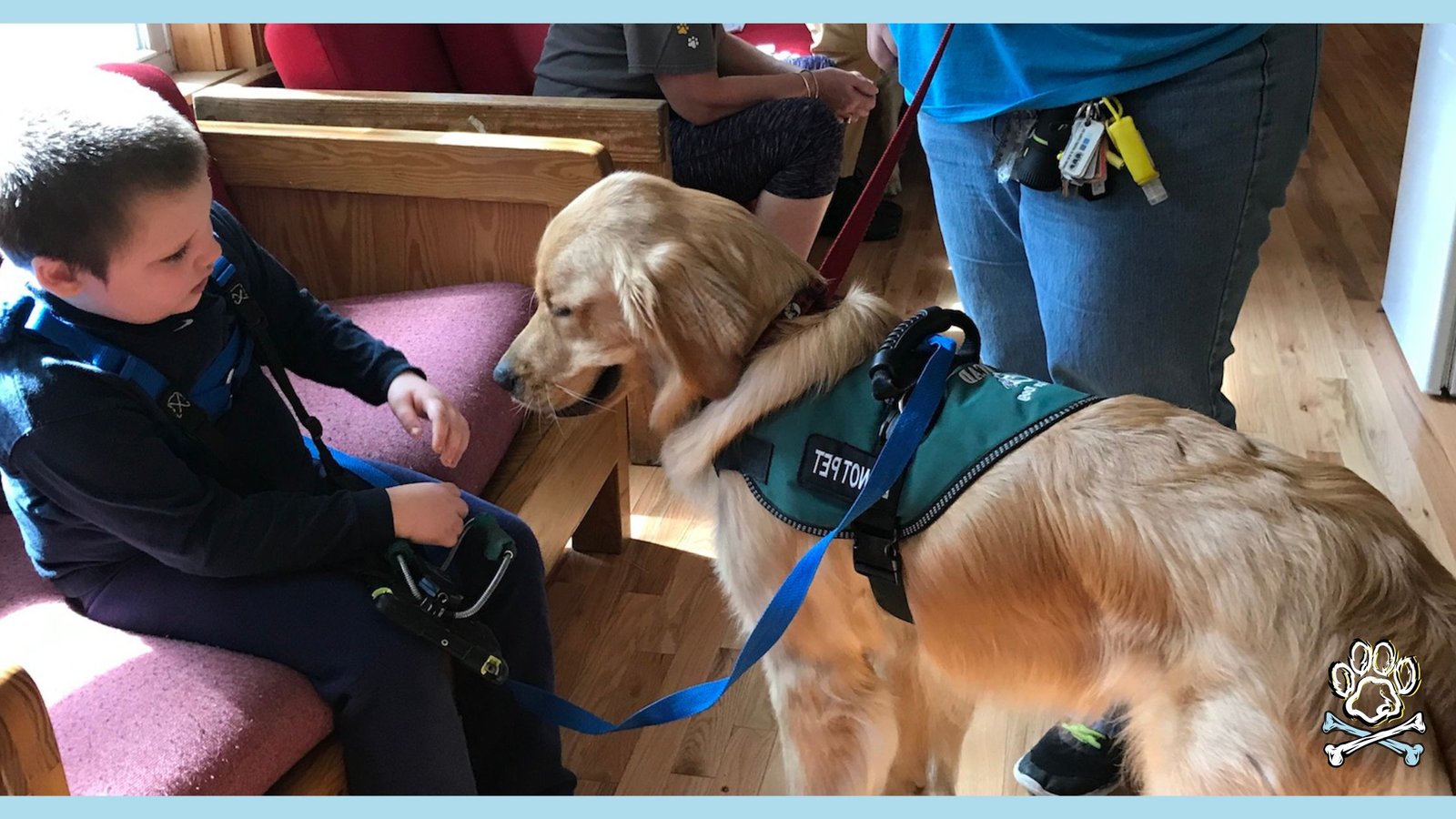
PERSONAL STORIES: THE IMPACT ON FAMILIES
Behind every autism service dog partnership is a unique and powerful story of hope, resilience, and transformation. For families navigating the challenges of autism, these dogs can be a lifeline, bringing joy, comfort, and newfound independence to their daily lives.
Meet Emily And Alex And See How Charlie And Luna Changed Their Lives
Emily, a young girl of twelve years, faced challenges with autism. Anxiety and sensory overload made social situations very difficult for her. But then, Charlie, a service dog, entered Emily’s life. Charlie’s calming presence helped Emily manage her emotions and stay focused. With Charlie by her side, Emily grew more confident in facing daily tasks. Emily’s mom said, “Charlie is family. He provides love and support for Emily.” Charlie made a big difference in Emily’s life.
Alex, a nine-year old boy with autism, also had a service dog named Luna. Before Luna, Alex struggled to communicate his needs. He often had meltdowns when feeling overwhelmed. But Luna could sense Alex’s emotional state. Luna’s deep pressure therapy helped Alex a lot. Alex’s dad shared, “Luna gave Alex a voice and security he never had before. Seeing their bond and Alex’s progress is amazing.” Luna made a positive impact on Alex and his family.
These stories show how autism service dogs can change lives. The dogs provide emotional support and practical help. They act as social bridges and aid growth. These special dogs truly transform lives through their partnerships.
🔑 Key Points: Real stories show autism service dogs can greatly improve lives. These dogs help kids with autism and their families in many ways. Their help is truly incredible.
Autism Service Dogs: From Selection to Certification and Beyond
An autism service dog has a long journey. It starts when breeders choose puppies with the right traits. They pick pups with calm tempers and ability to learn. After selection, the dogs get lots of training. This often takes two years. They learn skills to help kids with autism. The training is intense and detailed.
Next is matching each dog to a child. Experts think about the child’s needs and personality. Then they find the dog that fits best. They make sure child and dog will work well together. Team training follows. The child, family, and dog practice together. Trainers guide them as they learn teamwork. They face real-life situations and build strong bonds. After passing tests, the team is certified and ready.
A Quick Summary About Service Dogs For Children With Autism
In short, providing children with autism access to service dogs can truly make a big difference. By carefully matching each child with the right dog, providing custom training, and offering ongoing support, families can experience improved social skills and reduced stress. These incredible service dogs play a vital role in enhancing communication, practical abilities, and overall quality of life for children with autism.
Organizations like Integrity Inc. do excellent work. They ensure each child is paired with the perfect dog. And they provide continuous support to maintain effectiveness. The emotional and practical assistance offered by these service dogs is invaluable. It creates a positive impact on families and individuals. By selecting the right dog and understanding legal considerations, families can begin a journey toward a brighter future. They’ll have companionship and unconditional support.
Let’s embrace the transformative power of service dogs. Let’s take the first step toward a more fulfilling life for our children with autism. Integrating a service dog involves team training and ongoing recertification. But the benefits make it worthwhile. These dogs can improve communication, practical skills, and quality of life. With dedication and the right match, families can experience enhanced social skills and stress relief.
